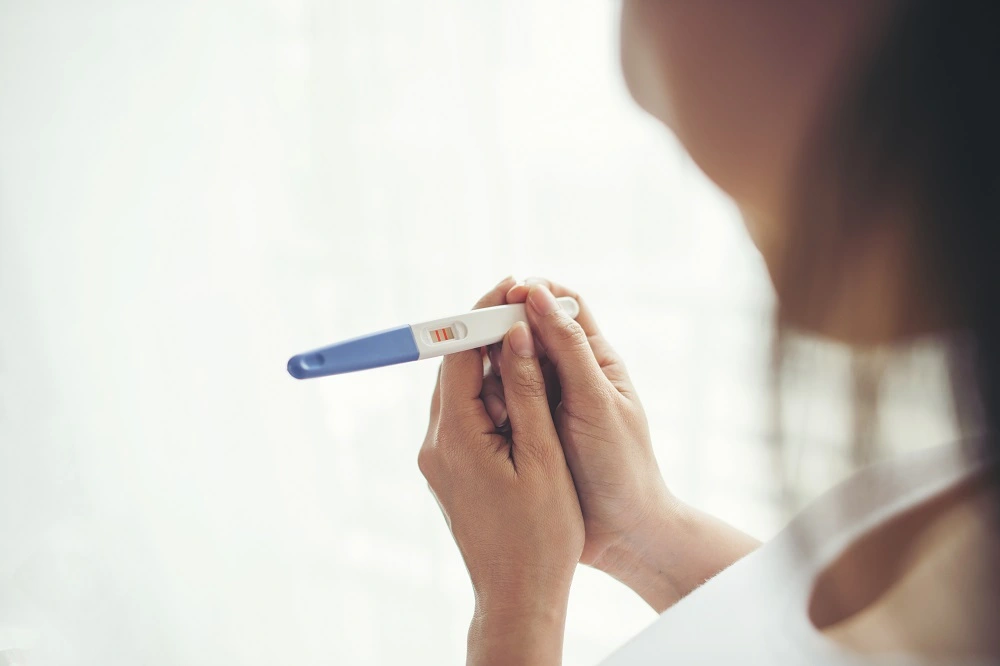Whether you’re eagerly hoping for a positive result or anxiously waiting to find out, the result that lies in your pregnancy test kit can open a new chapter in your life.
This comprehensive guide will walk you through everything you need to know about pregnancy tests, including when to take one and how they work.
What is a pregnancy test?
A pregnancy test is a tool you can use to determine if you’re pregnant. These tests detect the presence of the hormone human chorionic gonadotropin (hCG) in your urine or blood, which your body produces after a fertilized egg attaches to the lining of your uterus.
There are two main types: urine tests, which you can do at home, and blood tests, which are conducted at a doctor’s office.
Home pregnancy tests are commonly available and easy to use. You simply collect a sample of your urine, either by holding a stick in your urine stream or by dipping a test strip into a collected urine sample. The test will indicate whether or not hCG has been detected, usually through a line, symbol or digital readout.
Blood tests for pregnancy, performed by a healthcare professional, can also measure hCG levels and are used to provide more detailed information or confirm early pregnancies.
When should I take a pregnancy test?
The timing of taking a pregnancy test is crucial for accurate results. Ideally, you should wait until the first day of your missed period.
This is around two weeks after ovulation. At this point, the levels of the hormone hCG, which the test detects, are usually high enough to be measured in your urine.
Here’s what might happen or what you should do if you…
- Test too early: You might get a false negative because your hCG levels haven’t risen sufficiently
- Have irregular periods: You should wait at least three weeks after possible conception before testing
- Are anxious to know sooner: Use tests that are sensitive enough to detect pregnancy a few days before your missed period, but keep in mind that these early results may not be as reliable
- Get a negative result but suspect you might be pregnant: Wait a few days and test again

How soon can you take a pregnancy test?
Generally, you can take a home pregnancy test as early as the first day of your missed period. Some sensitive tests claim to detect pregnancy a few days before your period is due.
However, for the most reliable result, it’s best to wait until after your period is late. This is because the hormone hCG, which pregnancy tests detect, may not be high enough to register accurately in the early days.
What time should I take a pregnancy test?
The best time of day to take a home pregnancy test is in the morning, particularly with your first morning urine. This urine sample contains the highest concentration of hCG, making it ideal for detecting pregnancy. By choosing this time, you maximize the accuracy of your test results. If you take the test later in the day, your urine might be diluted, which could lead to a false negative result.
How do pregnancy tests work?
Pregnancy tests are designed to react with hCG. This hormone is produced by the placenta shortly after the embryo attaches to the uterine lining, which happens about six to twelve days after fertilization. When you take the test, a chemical in the test strip reacts with the hCG in your urine, often displaying the result as a line, a color change or a symbol such as a plus or minus.
What are the advantages of using a home pregnancy test?
Home pregnancy tests offer numerous advantages:
-
-
- Privacy and comfort. You can take the test in the comfort of your own home without the need for an appointment or the involvement of medical professionals. This privacy can be especially valuable if you prefer to keep your potential pregnancy confidential in the early stages.
-
- Ease of use. These tests are straightforward to use. All you need to do is apply a urine sample to the test and wait a few minutes for the results.
-
- Convenience and accessibility. Home pregnancy tests, including digital tests, are available over the counter at most pharmacies. This means you can purchase and use them at any time without waiting for a doctor’s visit.
-
- Speed. You will know whether you are pregnant or not within a few minutes.
-
- Accuracy. When used correctly, home pregnancy tests are about 99% accurate even before a missed period.
-
How long does it take to get the results of a pregnancy test?
One of the biggest advantages of home pregnancy tests is the quick turnaround time for results. Most tests will give you a result in about 1 to 5 minutes. The time it takes for the result to appear will be specified in the test’s instructions.
Key takeaway
The time you take a pregnancy test can affect your results. If you test too early, you may not get an accurate depiction of your pregnancy status. Also, if you get a negative result but still suspect you’re pregnant, retest a few days later or consult with your healthcare provider for further testing.




















































